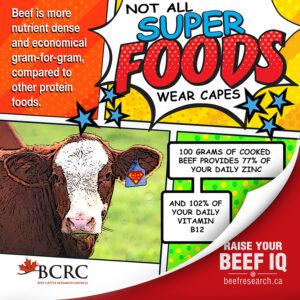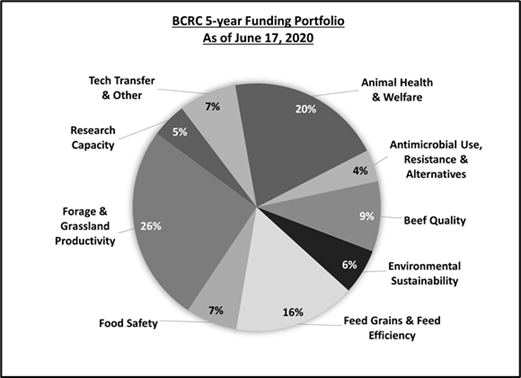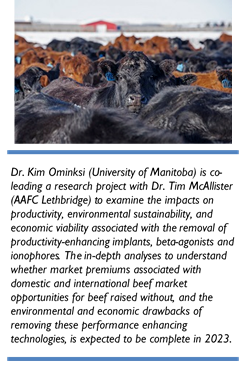What’s been done and what’s next? An update from our Executive Director, Andrea Brocklebank
We are pleased to provide our annual report in two formats to highlight some of our deliverables and challenges in 2020. Please don’t hesitate to contact us with feedback at [email protected].
| Video guide: 0:38-1:32 – Who we are |
Who is the BCRC?
The Beef Cattle Research Council (BCRC) is Canada’s industry-led funding agency for beef, cattle and forage research. Its mandate is to determine research and development priorities for the Canadian beef cattle industry and to administer the Canadian Beef Cattle Check-Off funds allocated to research. The BCRC is led by a 14-member Council, comprised of 13 producers and one member at large, who proportionally represent each province’s research allocation of the Canadian Beef Cattle Check-Off.
The BCRC is completing its third year of a ten-year plan presented with the increase in Canadian Beef Cattle Check-Off in 2018/19. The allocation of check-off funding to beef research increased to be in line with the National Strategy recommendations – acknowledging historic under funding of research and the need to address many significant priorities.
BCRC continues to operate within a 10-year plan in an effort to manage multi-year research funding contracts (3 to 10 years in length). This plan is built on the assumption that provincial allocations of the national check-off to research will remain unchanged moving forward.
Impacts of COVID-19 on BCRC Activities

Since March 2020, the BCRC has been working closely with industry and government to assess the impacts of the COVID-19 pandemic on research at facilities across the country. The impacts vary greatly across the provinces and depend on factors including project requirements, as well as local pandemic situations. Most of the ongoing research projects continued with minimal interruption. Some of the projects which were scheduled to start as early as April 2020 were delayed, however all projects are scheduled to continue. The second wave of the pandemic during the fall could result in further delays although the overall impact is undetermined at time of writing. BCRC continues to work with its funding partners, including AAFC to evaluate if there will be any program and/or budget implications for 2020/21 or 2021/22, but to date the impact has been minimal on the research program.
Specific to the pandemic, BCRC funded COVID-19 related research initiatives including investigating technology to support the remote delivery of inspection services, research to determine the risk of COVID-19 infection due to changing airflows in processing facilities as COVID-19 physical barriers are put in place, and economic analysis to support the development of eastern cattle price insurance indices. BCRC extension programming has continued to operate without interruption.
Overall, the impact of COVID-19 on the BCRC budget and operations has been manageable, given the flexibility in allocating industry funding across years, the existing online platforms for resource and program management and the ability of BCRC staff to work remotely as required. Larger than expected funding deferrals did occur in 2019/20 due to delayed project start-ups. Most of these projects are set to start up spring of 2021.
National Beef Strategy Renewed
The BCRC is a key partner in renewing and achieving the goals of Canada’s five-year National Beef Strategy. Research and/or technology transfer outcomes are relevant under each of the four pillars of the 2020-2024 Strategy; productivity, competitiveness, beef demand, and connectivity.
Building on the five-year goals identified in the National Beef Strategy, industry identified a suite of ambitious ten-year goals to address continually improving practices, reducing carbon footprint and enhancing natural environments. The ten-year goals address animal health and welfare, greenhouse gas and carbon sequestration, land use and biodiversity, water, beef quality and food safety, human health and safety, and technology. These goals will direct key BCRC programming and priorities through the next 5-year Research & Extension Strategy, which will be published in June 2021. Visit beefstrategy.com for more information on the National Beef Strategy.
Beef Science Cluster III in Year Three of Five

The Science Clusters are a partnership with Agriculture and Agri-Food Canada (AAFC) that combines their strengths with the BCRC’s to make joint-investments in a variety of research programs with the greatest potential to advance the industry.Projects funded under the current Beef Science Cluster III under the Canadian Agricultural Partnership (CAP) run from April 1, 2018 to March 31, 2023. The third Cluster is a $21.7 million program, with AAFC contributing $14.1 million and BCRC and industry partners contributing a total of $7.6 million over the five years. There are 27 Cluster projects, including Science Coordination, managed by the BCRC. The multi-year research projects are all underway but not yet complete, however there are some preliminary findings. Relating to food safety, analyses of 750 STEC isolates collected from cattle and processing plants indicate that E. coli are not becoming more resistant to heat-based food safety interventions. Specific to animal health, preliminary data indicates that aside from body energy status, a rest stop did not benefit the welfare, health or performance of weaned, conditioned calves transported for 12 or 36 hours. Related to feed efficiency, findings have helped researchers better understand how bacteria use substrates such as pre and probiotics. A summary of each project is available on BeefResearch.ca.
Priority Research Projects Underway
In addition to the projects within the third Science Cluster, BCRC funds research projects aimed at achieving specific goals of high priority to the beef industry. During 2020, 17 research projects funded by BCRC were initiated, and are scheduled to be complete in two to four years. The research will focus on various practices, including: antimicrobial use and resistance in cow-calf herds and whether anything will change after the switch to prescription only sales of medically important antimicrobials; characterization and optimization of visual pen checking criteria to improve BRD treatment outcomes in feedlot cattle; and forage potential of Hybrid Fall Rye (HR) in Alberta and Saskatchewan, to list a few. A study is also underway to estimate the economic impact of the Canadian cattle industry. A summary of each project is available on BeefResearch.ca.
Proof of Concept Informs Research Investment
BCRC continues to allocate funding to short-term (six months to one year) proof of concept based (POC) research to help inform whether a concept is worth pursuing as a larger, more defined research investment in that area. Three POC projects are now complete. One explored whether using “good” bacteria could be used to prevent spoilage in meat, while another studied whether prebiotics and probiotics can help avoid respiratory disease and antimicrobial treatment. The third tested whether seeding high legume forages between the rows of corn plants would reduce the need for fertilizer and supplementation for cows grazing corn. Researchers were faced with a drought and yields fell short but it was shown that intercropping legumes and corn is possible. The BCRC has committed funding to a second project to test different agronomic practices (e.g. wider row spacing) and evaluate animal performance when grazing corn/legume pastures. In 2020, four additional POC projects were initiated.
Knowledge and Technology Transfer (KTT)
The KTT project funded under the Cluster program focusses on enhancing technology transfer in the Canadian beef industry through various tools including: articles and regular social media activity; fact sheets on various research priority areas; interactive decision-making tools; videos; articles for Canadian Cattlemen’s the beef magazine; webinars; blog posts; infographics and radio clips.
In addition to the KTT project funded under the Cluster, BCRC funds technology transfer and production economics initiatives managed by external groups including researchers as well as provincial and other beef organizations. One example is the Forage U-Pick tool.
The BCRC also initiates and funds collaborative extension projects of priority. One such project currently underway is the Eastern Extension Content Project, which is identifying information and data gaps in current BeefResearch.ca content and enhancing resources to reflect the production practices of Eastern Canadian beef producers.
While it is difficult to measure or quantify the adoption of innovative knowledge, especially in the short term, BCRC’s technology transfer efforts appear to be successful due to consistently positive feedback from producers and other stakeholders, increasing website traffic, increasing subscribers and followers, and increasing levels of redistribution of BCRC resources by other publications and organizations. Visit BeefResearch.ca to access or download the BCRC resources.
Beef Mentorship Program Engages Applied Researchers

BCRC supports a Beef Researcher Mentorship Program to facilitate greater engagement of upcoming and new applied researchers with Canada’s beef industry. The 2020/21 mentees, mentored by beef producers and other industry experts, include: Dr. Alexander Koiter, an assistant professor in the Department of Geography and Environment at Brandon University; Dr. Christine Liu, a research scientist at the Lacombe, Alberta AAFC Research Station; Dr. Jonathan Bennett, an assistant professor of plant ecology at the University of Saskatchewan; Dr. Marcos Cordeiro, who holds a PhD in Biosystems Engineering from the University of Manitoba; and Dr. Monika Gorzelak, a soil microbial ecologist and Dr. Trevor Coates, a specialist in air quality and greenhouse gases, both at the Lethbridge, Alberta AAFC Research and Development Centre in Lethbridge.
Canadian Beef Industry Award for Outstanding Research and Innovation

Dr. Karen Beauchemin, a Principal Research Scientist of Ruminant Nutrition at AAFC’s Lethbridge Research and Development Centre, was awarded the 2020 Canadian Beef Industry Award for Outstanding Research and Innovation. She has assisted producers, researchers, veterinarians, nutritionists, and policymakers across Canada with numerous research projects on ruminant nutrition, such as feed additives and diet formulations, and industry-relevant issues, such as the environmental sustainability of beef cattle production while improving animal performance. Dr. Beauchemin’s work on emissions is a major asset to Canadian beef producers. Her work has not only led to a better understanding and quantification of greenhouse gas produced by cattle, but she continues to lead the way in researching new ways to reduce the overall impact.
Advancement of the Verified Beef Production Plus program
BCRC remained responsible for the delivery of the Verified Beef Production Plus (VBP+) program during 2020/21. Learn more about VBP+ at http://verifiedbeefproductionplus.ca/
Click here to subscribe to the BCRC Blog and receive email notifications when new content is posted.
The sharing or reprinting of BCRC Blog articles is welcome and encouraged. Please provide acknowledgement to the Beef Cattle Research Council, list the website address, www.BeefResearch.ca, and let us know you chose to share the article by emailing us at [email protected].
We welcome your questions, comments and suggestions. Contact us directly or generate public discussion by posting your thoughts below.

